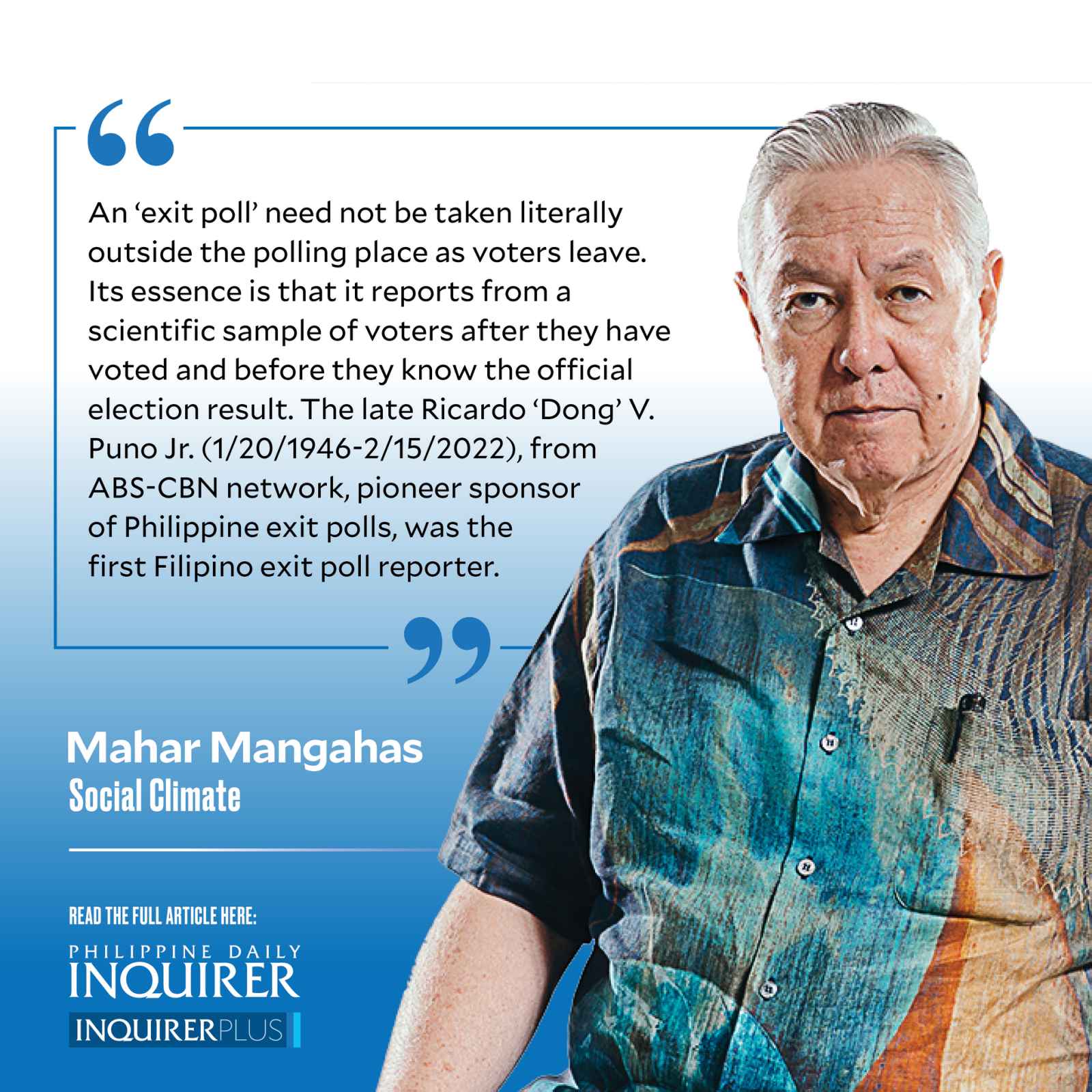
An “exit poll” need not be taken literally outside the polling place as voters leave. Its essence is that it reports from a scientific sample of voters after they have voted, and before they know the official election result.
The late Ricardo “Dong” V. Puno Jr. (1/20/1946-2/15/2022), from ABS-CBN network, pioneer sponsor of Philippine exit polls, was the first Filipino exit poll reporter.
The first few day-of-election polls, done by SWS for ABS-CBN, were conducted, not outside polling places, but in the voters’ homes after they had returned from voting. This technique was the brainchild of Mercedes “Mercy” Abad, SWS cofounder and head of the research company Total Research Needs—SWS field-provider at the time—whose prime concern was the personal safety of the all-female field staff.
The first exit poll was on 5/11/1992, election day, in Manila (n = 478), Quezon City (n = 480), and Makati (n = 509). It was cosponsored by the Manila Chronicle. It was Dong Puno, presumably, who announced over ABS-CBN the next day the poll’s winning mayors and vice mayors, which all proved correct.
The second exit poll was on 5/8/1995, cosponsored by ABS-CBN and the Philippine Daily Inquirer. It correctly called 11 of the 12 winning senatorial candidates.
There was no fuss about exit polling until the election of 1998. Here is Dong Puno’s own story (from his column, “Why the exit polls needed that TRO,” Philippine Star, 5/17/1998).
“… What happened was this: Towards the end of April, newspaper reports quoted [Comelec] Commissioner Manolo Gorospe stating that an ‘application’ of ABS-CBN to conduct exit polls had been denied, and that such polls had been ‘banned.’ Trouble was, ABS-CBN never filed any such application. It didn’t file any applications in 1992 and 1995 when it conducted exit polls and the Comelec never expressed any disapproval when the 1995 exit polls for senatorial candidates were broadcast. We didn’t file because we didn’t think we had to, since no law or regulation required us to do so.
“Moreover, the newspaper reports notwithstanding, ABS-CBN never received any restraining order from the Comelec. But on May 4th, a week before the elections, one of our reporters called to say that she had seen a Comelec ‘order’ prohibiting the station from conducting such polls. On further checking, we were given a certified copy not of any order but of minutes of a Comelec en banc meeting held on April 21, 1998. The minutes refer to a memorandum dated 16 April 1998 of Chairman Bernardo Pardo citing ‘reliable information that ABS-CBN (Lopez Group) has prepared a project, with PR groups, to conduct radio-TV coverage of the election ’98 and to make exit survey of the voter’s vote during the elections for national officials, particularly for President and Vice-President, results of which shall be broadcast immediately.’
“In the meeting, the Commission passed a Resolution approving the issuance of a restraining order ‘to stop ABS-CBN or any other Groups, its agents or representatives from conducting such exit survey’ and authorized Chairman Pardo to issue the same. The bases for this restraining order were, first, that ABS-CBN had not been authorized to undertake an exit survey and, second, the survey might conflict with the official Comelec and Namfrel media-based unofficial quick-count.
“The Comelec was obviously misinformed. … SWS is most assuredly not a PR group. … With a week to go before elections, the Chairman not having issued the order, the possibility was real that the order would be issued close to election day, probably during the holiday weekend when no courts would be open. Note that no hearing had been called to enable SWS and ABS-CBN to explain the project. In fact, until it got a copy of the minutes of the April 21 meeting, the company didn’t even know the Commission was discussing exit polls in their sessions.
“ABS-CBN had no choice but to act immediately. On May 6th it filed a petition with the Supreme Court for certiorari with prayer for a temporary restraining order against the Resolution of April 21, 1998, or the restraining order if already issued pursuant to that Resolution. The petition asked for nullification of that Resolution on the ground that no law declares exit polls illegal; the Resolution was arrived at without due process of law accorded to ABS-CBN or SWS to explain its side; and any restraining order prohibiting exit polls would violate constitutional guarantees of freedom of speech and freedom of the press.”
I don’t know if the Comelec’s intended order to ban exit polling was ever issued. A few days before the election on May 11, 1998, Dong phoned me to ask if SWS was willing to proceed without any signal from the Supreme Court. I replied that ABS-CBN had released our expense money, so our field staff were deployed and ready for him to say GO. Just before May 11, the Supreme Court issued the TRO against Comelec.
The Supreme Court finally ruled (GR No. 133486, 1/28/2000) that exit polling and its dissemination are constitutionally protected (Artemio V. Panganiban, “ABS-CBN v. Comelec: Exit Polls – a New Paradigm of Free Expression,” in “Transparency, Unanimity and Diversity,” Supreme Court Press, 2000).
Dong Puno reported the exit poll on ABS-CBN 24 hours after the election. Based on a national sample of 5,598 voters, it put Joseph Estrada’s votes for president at 39.2 percent and Gloria Macapagal-Arroyo’s votes for vice president at 50.0 percent. The official results of Estrada 39.9 percent and GMA 49.6 percent were issued only on May 27, 1998, 16 days after the election.
——————
Erratum: in last week’s “Ferdinand Marcos ran away,” 2/19/22, the position of Blas Ople was misstated as ambassador to the US; he was secretary of labor.
——————
Contact: mahar.mangahas@sws.org.ph

